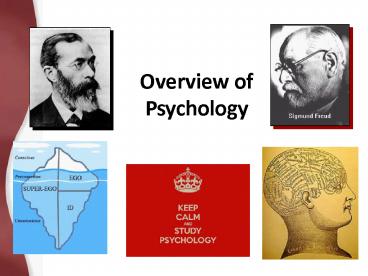Overview of Psychology - PowerPoint PPT Presentation
1 / 19
Title:
Overview of Psychology
Description:
Health Psychology. Explores relationship between psychological factors and physical ailments or disease ... Chapter 1: Introduction to Psychology Last modified by: – PowerPoint PPT presentation
Number of Views:251
Avg rating:3.0/5.0
Title: Overview of Psychology
1
Overview ofPsychology
2
Wilhelm Wundt gets it started
First Experimental Psych Lab (1879)
Focuses on the scientific study of the mind. WW
insists that Psych methods be as rigorous as the
methods of chemistry physics.
Wundts students start labs across USA (1880-1900)
Wilhelm Wundt (1832-1920)
University of Leipzig Harvard University Yale
University Columbia University Catholic
University Univ of Pennsylvania Cornell
University Stanford University
3
Then Freud Psychoanalysis enter the scene
Proposes the idea of the UNCONSCIOUS
Thoughts, memories desires exist below
conscious awareness and exert an influence on
our behavior
Unconscious expressed in dreams slips of the
tongue
Sigmund Freud (1856-1939)
Psychoanalytic Theory attempts to
explain personality, mental disorders
motivation in terms of unconscious determinants
of behavior
4
https//www.youtube.com/watch?vNCXynjpFaKU
(134) Freuds Id, Ego and Superego
5
The I.B Curriculum breaks Psychology into 3 core
fields
- Biological Level of Analysis
- Cognitive Level of Analysis
- Sociocultural Level of Analysis
6
I.B then examines in brief, other branches of
Psychology
- Abnormal Psyc
- Developmental Psyc
- Health Psyc
- Psyc of Human Relationships
- Sport Psyc
Lets examine some of these briefly
7
Abnormal Psychology
- Brainstorm 1
- 10 traits of a normal person
8
Abnormal Psychology
- Brainstorm 2
- 10 traits of a abnormal person
9
Szasz (1962) argued that the role of Psychiatry
is to exclude from society those seen as
exhibiting socially unacceptable behaviors or
beliefs
Diagnosing Abnormalitiesthe Diagnostic and
Statistical Manual of Mental Disorders (DSM)
- Published by the American Psychological
Association
10
DSM IV
- Axis I Clinical syndromes
- Axis II Personality disorders mental
retardation - Axis III General medical conditions
- Axis IV Psychosocial and Environmental problems
- Problems with primary support group
- Educational problems
- Occupational problems
- Housing/economic problems
- Problems with access to health care services
- Problems with legal system/crime
- Other psychosocial problems environmental
problems - Axis V Global Assessment of Functioning
- Ranges from (inadequate information) 100
(superior functioning)
https//www.youtube.com/watch?vOif3xDjlV5I
(147) DSM IV TR Explained- Vita Creativity
Company
11
Developmental Psychology
- Changes in behaviour from womb to tomb
- Investigates human growth
https//www.youtube.com/watch?v8O6z5-WTHt0
(354) What is Developmental Psychology
12
Health Psychology
- Explores relationship between psychological
factors and physical ailments or disease - An ounce of prevention to avoid years of cure
https//www.youtube.com/watch?vRyP8L3qTW9Q
(345) The Science of Stress Physiology Emotions
Fight Flight
13
Psychology of Human Relationships
- Social responsibility
- Interpersonal relationships
- Violence
14
Sport Psychology
- Emotion Motivation
- Skill development performance
- Problems in sports
https//www.youtube.com/watch?vvx3KJn8r8y0
(213) The Armstrong Lie Official Trailer 1 2013
15
1. The Biological Level of Analysis
- Specializes in the biological bases of behaviour
- Behaviour is dictated by
- -Genetics
- -Hormones
- -Neurotransmitters in the brain
- -Changes in brain activity
16
2. The Cognitive Level of Analysis
- Emphasis on higher mental processes
- The stuff that you cant see- how you process
inputs
In opposition to Behaviourism- the study of
observable behaviour
17
2. The Cognitive Level of Analysis
Principals that define the Cognitive LOA
- Humans have mental representations of their world
and these representations differ from person to
person - These mental representations can be
scientifically investigated - Cognition is the hidden world of mental
processing
18
3. The Sociocultural Level of Analysis
- Principals that define the Sociocultural LOA
- The social and cultural environment influences
human behaviour - We want connectedness with, and a sense of
belonging to others - We construct our conceptions of the individual
social self (who am I?)
Brainstorm- Have you viewed yourself differently
in certain phases of your life? Think then share
with someone
19
Clinical Psychology
- Diagnosis of mental disorders
- Treatment of mental disorders
- The application of all the areas we talked about
to help people

























![❤️[READ]✔️ Investigative Psychology: Offender Profiling and the Analysis of Criminal Action PowerPoint PPT Presentation](https://s3.amazonaws.com/images.powershow.com/10053322.th0.jpg?_=202406111010)
![[Read] Investigative Psychology: Offender Profiling and the Analysis of Criminal Action PowerPoint PPT Presentation](https://s3.amazonaws.com/images.powershow.com/10055251.th0.jpg?_=202406141012)




